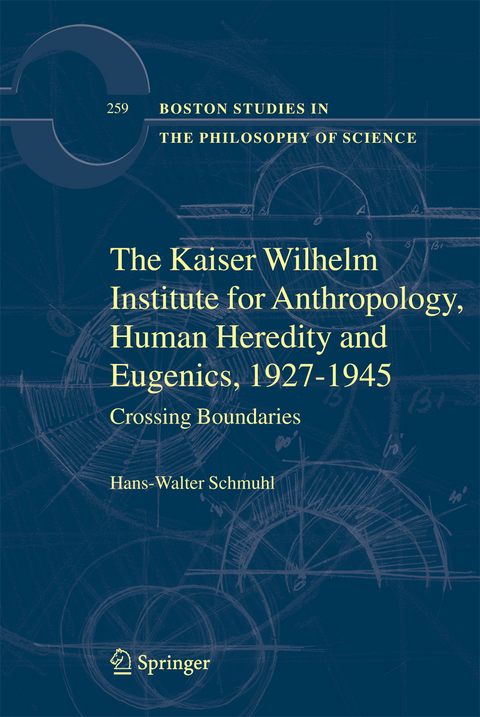
The Kaiser Wilhelm Institute for Anthropology, Human Heredity and Eugenics, 1927-1945
Crossing Boundaries
Seiten
2010
|
Softcover reprint of hardcover 1st ed. 2008
Springer (Verlag)
978-90-481-7678-6 (ISBN)
Springer (Verlag)
978-90-481-7678-6 (ISBN)
From its founding in 1927 until its dissolution in 1945, the Kaiser Wilhelm Institute for Anthropology, Human Genetics, and Eugenics (KWI-A) in Berlin-Dahlem transgressed many a boundary; indeed, the transgression of boundaries was in a sense its raison d’être from the outset. Initially this applied to the boundaries within the disciplinary canon of the human sciences. Even from its basic conception, the institute, centered around the person of its founding director Eugen Fischer (1874– 1967), was to unify anthropology, genetics, and eugenics under one roof. In ke- ing with the understanding predominant in Germany between the wars, anthropology went beyond the scope of the framework of the ascendant “race theory” to cover not only physical anthropology, including paleoanthropology, but also elements of what we today would call cultural and social anthropology. Thus, this anthropology extended far into the fields of archeology, paleontology, prehistory and early h- tory, history and sociology, and especially into ethnology and folklore. Human genetics, in turn, was more than the attempt to apply to humans the genetics dev- oped by Thomas Hunt Morgan (1866–1945) and his school in the USA on the model of drosophila. In Germany, Morgan’s genetics, which concentrated on investigating the dissemination of genetic traits on the chromosomes and their morphological structure, was received with skepticism for two reasons.
A “Purely Theoretical Institute for the Study of the Nature of Man”: The Founding of the Kaiser Wilhelm Institute for Anthropology, Human Heredity, and Eugenics, 1920–1927.- “The Human of the Future Under the Scrutiny of Research”: The Kaiser Wilhelm Institute for Anthropology, Human Heredity and Eugenics in the Weimar Republic, 1927–1933.- The “Faustian Bargain”: The Kaiser Wilhelm Institute for Anthropology, Human Heredity and Eugenics in the National Socialist Era, 1933–1938/1942.- In the Realm of Opportunity: The Kaiser Wilhelm Institute for Anthropology, Human Heredity and Eugenics during World War II, 1938/42–1945.- Boundary Transgressions.
| Erscheint lt. Verlag | 19.11.2010 |
|---|---|
| Reihe/Serie | Boston Studies in the Philosophy of Science ; 259 |
| Zusatzinfo | XIV, 468 p. |
| Verlagsort | Dordrecht |
| Sprache | englisch |
| Maße | 155 x 235 mm |
| Themenwelt | Geisteswissenschaften ► Geschichte |
| Studium ► 2. Studienabschnitt (Klinik) ► Humangenetik | |
| Naturwissenschaften ► Biologie ► Humanbiologie | |
| Sozialwissenschaften ► Ethnologie | |
| Sozialwissenschaften ► Soziologie | |
| ISBN-10 | 90-481-7678-6 / 9048176786 |
| ISBN-13 | 978-90-481-7678-6 / 9789048176786 |
| Zustand | Neuware |
| Haben Sie eine Frage zum Produkt? |
Mehr entdecken
aus dem Bereich
aus dem Bereich
Eine sehr persönliche Geschichte | Der New York Times-Bestseller
Buch | Softcover (2023)
Ullstein Taschenbuch Verlag
21,99 €
Die revolutionäre Medizin von morgen (Lifespan)
Buch | Softcover (2020)
DuMont Buchverlag
16,00 €


